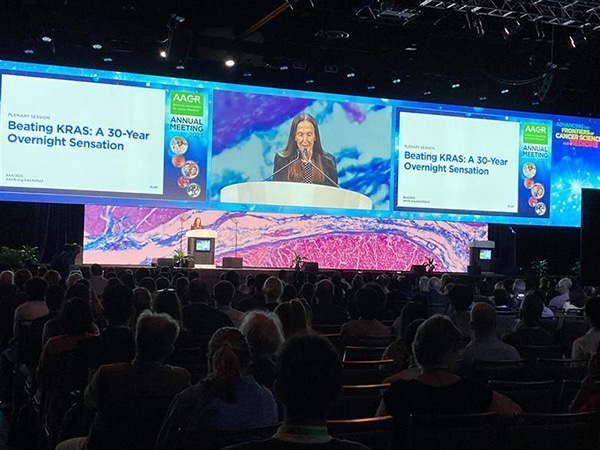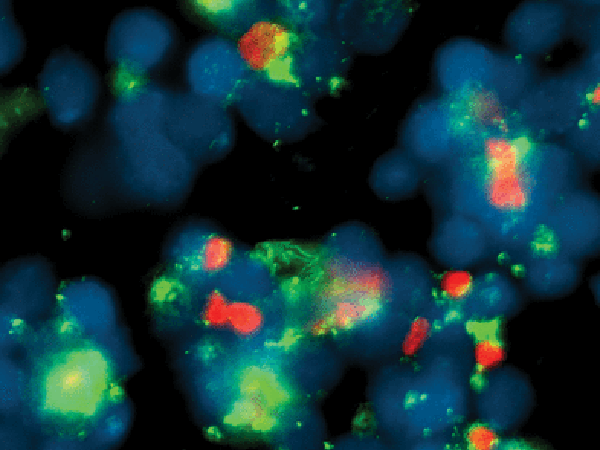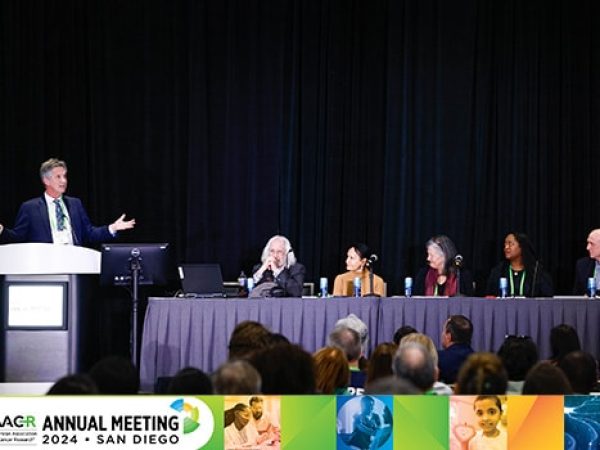AACR Annual Meeting 2023: Beating KRAS
The plenary program of the AACR Annual Meeting 2023 kicked off Saturday, April 15, with a session titled “Beating KRAS: A 30-year Overnight Sensation.”
The plenary session was chaired by Dafna Bar-Sagi, PhD, FAACR, and featured presentations from Bar-Sagi; Pasi Jänne, MD, PhD; Beatriz Carreno, PhD; and AACR Past President Frank McCormick, PhD, FAACR.
Discussions centered around the immense progress that has been made in the four decades since KRAS was first identified in human cells and determined to be an oncogene. The past 30 years in particular, speakers noted, have focused on developing therapies to inhibit the cancer-promoting activity of this protein.
“The race really got going around 1992 or 1993,” said McCormick, as he summarized significant findings throughout the history of KRAS, beginning with the 1964 discovery of the related Hras protein in mice. The early 1990s marked the beginning of the “kinase wave,” he noted, with the development of inhibitors targeting various kinases responsible for driving cancer. However, despite extensive efforts, inhibiting KRAS remained elusive, leading many to deem the protein “undruggable.”
That changed in 2013, when a seminal paper published by Kevan Shokat, PhD, FAACR, and colleagues indicated that KRAS might, in fact, be druggable. Today, two drugs, sotorasib (Lumakras) and adagrasib (Krazati), are clinically approved to treat patients with certain lung cancers that harbor the KRAS G12C mutation.

Ongoing research, such as the studies shared during this plenary session, aims to improve KRAS-targeted therapies by increasing responses, expanding the reach of inhibitors to other KRAS mutants, and circumventing treatment resistance.
In his presentation, McCormick highlighted some of the therapeutic approaches that are currently under evaluation to address these goals. He shared encouraging results from an investigational KRAS inhibitor, BBO-8520. Unlike sotorasib and adagrasib, which bind the inactive form of KRAS G12C, this compound targets the active form as well.
Due to this feature, McCormick explained, BBO-8520 inhibits RAS more quickly than either sotorasib or adagrasib because it avoids having to wait for RAS to cycle through from an active to an inactive state.
Jänne is also interested in inhibiting the active form of KRAS. He shared promising preclinical and clinical data illustrating the efficacy of investigational pan-KRAS inhibitors that target the active form of multiple KRAS mutants. He also discussed the potential of combining KRAS inhibitors with additional therapies, including immune checkpoint inhibitors.
Given the interest in combining KRAS-targeted therapeutics with immunotherapies, it is important to understand how KRAS mutations impact antitumor immunity, noted Bar-Sagi. She explained that the immune systems of RAS-mutated cancers are often dysregulated, opening opportunities for therapeutic intervention. “I think it’s going to be important in the future to identify both local and systemic nodes of immune modulation … in order to improve therapeutic success,” she said.
Researchers are also exploring harnessing the immune system in various ways to target KRAS-mutated cancers. Carreno reported that patients who received an investigational vaccine had T-cell responses against neoantigens found on KRAS-mutated cancers. Additionally, T cells engineered to recognize these neoantigens effectively killed patient-derived cancer cell lines and led to tumor regression in mouse models. The use of bispecific T cells and haptens to augment immune responses are also under investigation.
These discussions expand on research presented at the AACR Special Conference: Targeting RAS, held March 5-8. Research advances shared at the meeting were summarized in a recent blog post.
During the AACR Special Conference: Targeting RAS, prominent KRAS researchers provided perspectives on the past, present, and future of targeting KRAS. Their insights are captured in a recent AACR Stories video, featuring McCormick; Bar-Sagi; Shokat; Mariano Barbacid, PhD, FAACR; Andrew Aguirre, MD, PhD; and AACR Past President David Tuveson, MD, PhD, FAACR.



